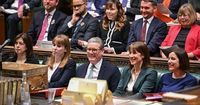It’s been a week of seismic shifts for Britain’s Labour government, with the resignation of Deputy Prime Minister Angela Rayner and a swirling scandal around Lord Mandelson, the UK’s ambassador to the United States. The fallout from these twin crises has left Prime Minister Sir Keir Starmer facing some of the most intense scrutiny of his tenure, with critics and supporters alike questioning his leadership and judgment as the party heads into a crucial period.
Angela Rayner’s resignation on September 5, 2025, came as a shock to many, though the storm had been brewing for days. Rayner, who also served as Deputy Labour Leader and Housing Secretary, admitted to underpaying stamp duty tax on a seaside flat in Hove. The admission followed a dogged investigation by The Daily Telegraph, which revealed a £40,000 shortfall in property tax payments. The story quickly became front-page news and set the tone for a tumultuous week in Westminster.
Ethics watchdog Sir Laurie Magnus weighed in with a damning verdict. While he acknowledged that Rayner had “acted with integrity and with a dedicated and exemplary commitment to public service,” Magnus concluded that she had failed to meet the “highest possible standards of proper conduct” expected of a cabinet minister due to the tax underpayment. The breach of the ministerial code was clear, and the political consequences were swift.
Sir Keir Starmer, visibly saddened by the turn of events, said he was “very sad” that Rayner’s time in government had come to an end and that he had “nothing but admiration” for her. Many within Labour and beyond praised Rayner’s journey from “a teenage mum from a council estate in Stockport” to the second highest office in government. Stourbridge MP Cat Eccles called her resignation “a huge loss to our government, the party and the country,” adding, “Angela has always been a tireless advocate for working people, a champion for women, and I’m sure she’ll continue that work on the backbenches.”
Rayner’s departure set off a rapid and divisive reshuffle in Starmer’s cabinet. The contest to fill her role as Deputy Labour Leader quickly became a focal point, with Education Secretary Bridget Phillipson, former Commons Leader Lucy Powell, Foreign Affairs Committee Chair Dame Emily Thornberry, and backbenchers Bell Ribeiro-Addy MP and Paula Barker MP all emerging as contenders. The all-woman contest underscored both the party’s internal divisions and its commitment to representation at the highest levels.
Yet, as the government scrambled to fill the vacuum left by Rayner, another, potentially more damaging scandal erupted. The Daily Telegraph once again led the charge, exposing a series of troubling connections between Lord Mandelson—Britain’s ambassador to Washington—and the late convicted paedophile Jeffrey Epstein. The revelations included the fact that Mandelson had stayed at Epstein’s New York mansion while Epstein was in prison, and that Epstein had brokered a £1bn deal involving a taxpayer-owned UK banking business during Mandelson’s tenure as business secretary. More sensational still was the discovery of a 238-page photo book, compiled for Epstein’s 50th birthday by Ghislaine Maxwell, featuring a ten-page handwritten tribute from Mandelson describing Epstein as his “best friend.”
The scandal sent shockwaves through both the government and the public. Media outlets from The Guardian to The Daily Mail splashed the story across their front pages. The Mail’s headline, “MANDELSON ON RACK OVER ‘BEST PAL’ EPSTEIN,” captured the growing sense of outrage, while columnist Stephen Glover wrote, “There is of course no suggestion whatsoever that Jeffrey Epstein laid on anything of that nature for Mandelson, whose taste are anyway well known to lie in the opposite direction. Other factors must explain the pervert’s attractions to Mandy. His vast wealth? His charm? His array of rich friends? Only His Britannic Majesty’s Ambassador to Washington can truly know the answer.”
Opposition parties wasted no time demanding an official inquiry into Mandelson’s appointment and calling for the release of all related documents. Even within Labour, MPs on the foreign affairs select committee expressed frustration that their earlier requests to question Mandelson had been blocked by the Foreign Office. Now, with public pressure mounting, some Labour MPs are openly calling for Mandelson’s dismissal, fearing that the scandal could do lasting damage to both Starmer’s leadership and the party’s electoral prospects.
The timing of the revelations could hardly be worse for the government. Mandelson is due to play a central role in the upcoming state visit of former US President Donald Trump from September 17-19, including attending a royal banquet hosted by King Charles at Windsor Castle. The prospect of mass anti-Trump rallies and the scrutiny of Mandelson’s presence at high-profile events have only heightened the controversy. As one columnist put it, “Can Lord Mandelson still credibly play a prominent role at the royal banquet? Or could a discreet phone call to Washington from Number 10 suggest he diplomatically develops a heavy cold that rules out flying?”
For Starmer, the dual crises have turned a difficult week into a political minefield. At Prime Minister’s Questions, he struggled to defend Mandelson, ducking and weaving as opposition MPs pressed him on what he knew and when about the ambassador’s relationship with Epstein. The episode has led some in the media to question whether Starmer can weather the storm. As one commentator noted, “A week is a long time in politics especially when you’re already on the ropes with an ultra-tricky party conference in Liverpool to come at the end of this month.”
Meanwhile, the government’s right-wing critics and even some of its natural media allies have seized on the scandals to question Starmer’s judgment. The Guardian and Observer, typically supportive outlets, have published opinion pieces reflecting the scale of the crisis and the uncertainty over whether Starmer can resolve it. At the same time, figures like Nigel Farage have celebrated Rayner’s resignation, viewing her as one of Labour’s most formidable campaigners.
As the dust settles, it’s clear that the events of early September 2025 have reshaped the political landscape. Angela Rayner’s resignation has left a leadership vacuum and sparked a fierce internal contest, while the Mandelson-Epstein scandal threatens to overshadow the government’s agenda just as it faces critical tests at home and abroad. With the Labour party conference looming and the state visit on the horizon, the coming weeks will be a defining period for Sir Keir Starmer and his government. Whether they can regain their footing—or whether fresh revelations will deepen the crisis—remains to be seen.






